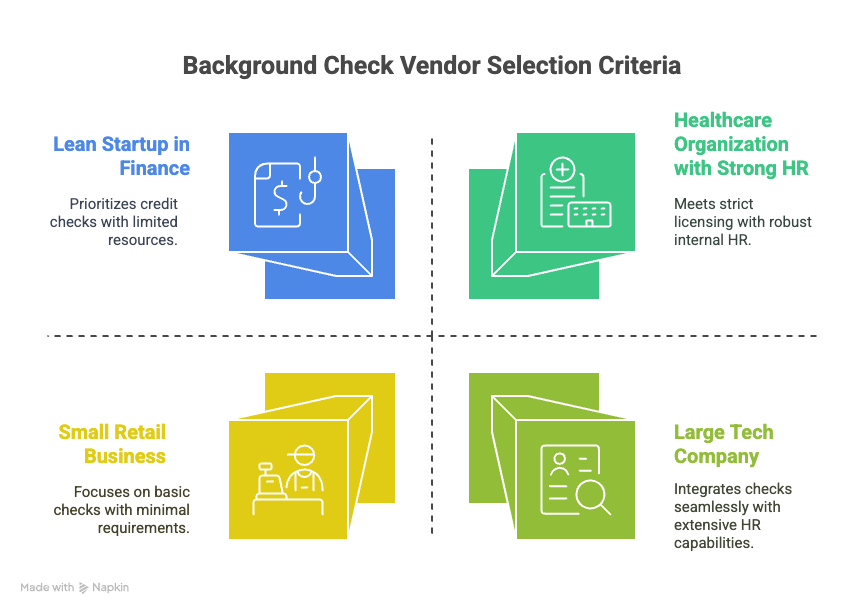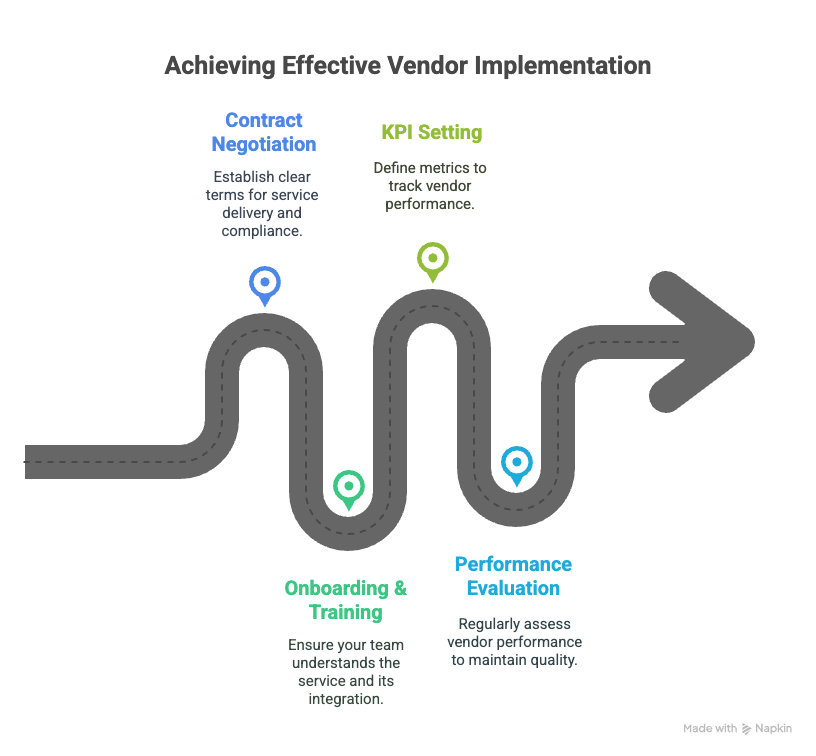Finding the right staffing background check vendor is crucial for any company looking to make informed hiring decisions. With myriad options available, selecting the right vendor can feel overwhelming. An effective background check provider can make a significant difference in the quality of hires and compliance with legal standards. This guide will break down everything you need to know, giving you the confidence to select a vendor that aligns with your organization's needs.
Key Takeaways
- Selecting a background check vendor is crucial to making informed hiring decisions that protect your company and ensure compliance with the law.
- Understanding your specific needs, including industry requirements and your internal capacity, sets the foundation for choosing the right vendor.
- Key criteria for vendor selection include compliance with laws such as the FCRA, accuracy of reports, quick turnaround times, and compatibility with your HR systems.
- Conduct thorough vendor comparisons through proposal evaluations, interviews, and reference checks to ensure they meet your standards.
- Ongoing evaluation of your vendor's performance and staying updated with industry changes helps maintain efficient hiring practices and legal compliance.
Introduction
Background checks are a critical part of the staffing process. They help ensure that the people you bring into your organization are trustworthy and have the right qualifications. An effective background check reduces the risk of costly bad hires and helps maintain a safe work environment. It’s not just about safety though. Thorough background checks also play a crucial role in compliance. Employers must adhere to legal standards, such as the Fair Credit Reporting Act (FCRA), which governs how background checks should be conducted.
This guide will arm you with the knowledge to choose the right background check vendor. You’ll learn about the important criteria to consider, the benefits of making the right choice, and the common mistakes to avoid. By understanding these elements, you can make better hiring decisions, protect your organization from potential risks, and remain compliant with the law.
EXPERT INSIGHT: As an HR professional navigating background checks, I've learned it isn't that check box of selecting the right background check vendor, it's having a good, accurate, responsible partner. It's those tighter calendars and higher stakes on closing the hire that having a good partner is the true game-changer. It's never bells and whistles—it’s whose information is rock-solid, whose responsive at the moment it matters most, and whose is as fired-up as yours is about stellar candidate experience. Make smart decisions here as it safeguards people, reputations, and culture that’s taken hours of sweat equity. Don’t skimp—invest in a vendor that’s an extension of your very own team. - Charm Paz, CHRP
Understanding Your Needs
Before you start shopping for a background check vendor, take a close look at what you really need. Start by identifying any specific requirements tied to your industry. For instance, healthcare organizations must meet strict licensing standards, while financial firms focus on credit checks. Consider the scale of your operations, too. Are you hiring in batches, or is it a steady flow throughout the year? Volume affects both pricing and the turnaround time you should expect from a vendor.
Next, assess your internal resources. How much of the background check process can you handle in-house? You might have a seasoned HR team, or you could be a lean startup with limited personnel. Match your capabilities with your budget. An organization with a modest budget must be strategic in selecting which checks to prioritize.

Do you have technological constraints? Some vendors offer systems that integrate seamlessly with your existing HR software, while others might require more effort on your part to implement. Finally, talk to your colleagues involved in hiring. Their insights will help clarify practical needs, like the importance of report clarity or the vendor's customer service record.
Thinking through these aspects upfront will put you on the right path. It ensures you won't pay for services you don't need or overlook necessary ones. Are there aspects of your hiring process that could be more efficient? Would additional capabilities from a vendor help lift the burden on your current staff? Answering these questions will guide you in making a choice that aligns with your organizational needs.
Key Criteria for Selecting a Background Check Vendor
Selecting a background check vendor involves several critical factors that contribute to the efficiency and legality of your hiring process. Each piece should align with your staffing needs and uphold industry standards.
Compliance and Legal Considerations: Your vendor must adhere to the Fair Credit Reporting Act (FCRA) and any other applicable state laws. Failing to comply can result in legal issues and damage to your company's reputation. Look up FTC guidance for detailed information on compliance requirements.
Accuracy and Reliability of Reports: Trust in the data provided is non-negotiable. Inaccurate reports can lead to mishires and potential legal challenges. Confirm that the vendor employs robust verification processes to minimize errors.
Turnaround Time: Fast processing times help keep your recruitment timeline intact. Vendors should deliver reports promptly to prevent hindrances in your staffing process. Evaluate their average turnaround time to ensure it meets your operational demands.
Technology and Integration: The vendor's technology should integrate seamlessly with your existing HR systems. Check for compatibility with your software to maintain a smooth workflow. Effective integration reduces manual entry, saving time and reducing errors.
Cost Analysis: Examine the vendor's pricing structure carefully. Know what's included, and identify any potential hidden fees. A transparent cost breakdown helps you budget more effectively and ensures there are no surprise expenses.
Customer Service and Support: Assess the quality of the vendor’s customer service. Quick and knowledgeable support can make a difference when issues arise. Opt for vendors with a strong reputation for being responsive and supportive.
Each of these criteria plays a pivotal role in your decision-making process. Prioritize based on your specific organizational goals and constraints.
Comparing Vendors
Creating a Shortlist: Start by filtering vendors based on your specific needs and key criteria. This might include their experience within your industry, their compliance history, or their technological capabilities. A focused approach will help you avoid getting sidetracked by vendors that don’t meet basic requirements.
Requesting and Evaluating Proposals: Clearly communicate your needs when requesting proposals. Ask vendors to address how they meet each of your requirements. Once you have the proposals, evaluate them critically. Look for clarity in pricing, service offerings, and support options. Compare how well each proposal aligns with your priorities.
Conducting Vendor Interviews: Talking to vendors can reveal insights not apparent from proposals alone. Prepare questions that probe their experience, problem-solving abilities, and understanding of your industry’s challenges. Pay attention to how they respond to questions about service failures and client complaints.
Reference Checks: Always check references. Contact other companies that have used the vendors’ services. Ask about their experiences, particularly regarding reliability and customer support. Look for patterns in feedback—both positive and negative—to get a clearer picture of what to expect.
Implementing the Vendor
Effective implementation ensures you gain the full benefits from your selected background check vendor. Begin with well-prepared contract negotiations. Focus on clear terms regarding service delivery, data handling, and compliance responsibilities. Detail the services included in the package and any potential additional charges. Address confidentiality and data protection, ensuring all terms respect legal standards.
Next, tackle onboarding and training. Schedule thorough onboarding sessions covering all aspects of the service and its integration with your HR systems. Make sure your team understands all processes, from report retrieval to compliance handling. The vendor should provide comprehensive support resources and responsive customer service for troubleshooting.
Set clear KPIs to track vendor performance. These could include report accuracy, turnaround times, and system downtime. Regularly review these KPIs to ensure the service consistently meets your needs. Schedule periodic performance evaluations to maintain quality and identify areas for improvement.

By following these steps, you’ll position your company to capitalize on the strengths of your chosen background check vendor, maintaining a smooth and efficient hiring process.
Industry Best Practices
Continuous evaluation of your background check vendor is crucial. Regularly assess their performance to ensure they meet your evolving needs. Consider scheduling annual reviews to discuss metrics like accuracy, turnaround time, and customer service responsiveness. If a vendor starts slipping in any of these areas, address it immediately. This ongoing dialogue helps catch minor issues before they become major problems.
Legal and industry standards can change fast. Stay informed by subscribing to relevant industry newsletters or joining professional groups that focus on employment checks. This keeps you ahead of the curve, allowing you to adjust practices before they're outdated. Make sure your vendor is also proactive in informing you of significant legal changes that might affect your processes.
Exploring advanced screening options could benefit your organization as it grows. Consider incorporating services like social media screenings or international checks if your hiring strategy expands globally. Though standard checks cover a lot, these specialized options offer deeper insights into a candidate's suitability for your organization. Always weigh costs against potential benefits when adding new services.
Common Pitfalls and How to Avoid Them
Overlooking Compliance: Failing to comply with the Fair Credit Reporting Act (FCRA) and other relevant laws can pose major legal issues. Ensuring your vendor is compliant with the FCRA is non-negotiable. Ask for proof of compliance during the selection process and regularly review their practices to keep your company safe.
Underestimating Costs: Vendor fees can add up quickly. Misjudging costs impacts your budget and operations. Scrutinize the pricing structure upfront. Look for hidden charges or additional fees for extra services. Ensure the vendor aligns with your financial plan by getting a clear cost breakdown.
Choosing Based on Price Alone: It's tempting to go for the lowest cost, but this approach often sacrifices quality. A vendor might offer cheaper services but at the expense of accuracy or turnaround time. Weigh the price against the quality of service to prevent a mismatch that could cost more in the long run. Prioritize value over price for better results.
Conclusion
Choosing the right background check vendor doesn't have to be complex. Focus on understanding your needs and identifying key criteria like compliance, accuracy, and cost. By comparing vendors carefully, conducting thorough interviews, and checking references, you can find a vendor that aligns with your goals. Avoid cutting corners to save money at the expense of quality. A well-chosen vendor can significantly enhance your staffing process, ensuring better hires and maintaining legal compliance. Get started today—empower your organization with a vendor that meets your high standards and operational needs.
Frequently Asked Questions (FAQs)
What should a staffing agency look for in a background check provider?
You should prioritize accuracy, compliance, and speed. Look for providers with proven experience in your industry. Check their technology for ease of integration with your existing systems. Ensure they offer a range of services like criminal checks and employment verification.
How do I compare background screening vendors?
Evaluate vendors based on cost, turnaround time, and service range. Ask for references to hear about others' experiences. Consider their customer support quality and the flexibility of their solutions to meet your specific needs.
What are the red flags when choosing a background check company?
Avoid companies with poor reviews or hidden fees. A lack of transparency in their process can be a concern. If their technology seems outdated or they can’t explain their compliance measures clearly, consider other options.
Is it better to use a global or local background screening vendor?
Choose based on your needs. A global vendor is ideal if your staffing covers multiple countries. They will have country-specific knowledge. For local operations, a local vendor might provide quicker response times and personalized service.
How can I ensure FCRA compliance with my background check vendor?
Ensure that your vendor provides clear guidelines about the Fair Credit Reporting Act. They should offer compliant forms and processes for adverse action. Regular updates on FCRA changes are a good sign of their commitment to compliance.
What role does customer service play in choosing a background check provider?
Good customer service means faster resolution of issues. Look for providers that offer direct lines to support teams and representatives who understand your business.
How critical is technology integration in background checks?
Seamless integration saves time and reduces errors. Check if the vendor’s software easily connects with your HR systems. This simplifies the hiring process and ensures data consistency.
What questions should I ask a potential background check provider?
Ask about their data security measures, average turnaround times, and scope of services. Inquire about how they handle disputes and their process for updating reports.
What are common pitfalls in the background screening process?
Failing to confirm candidate identity and missing key records are common issues. Ensure thorough checks are part of the package and confirm how the vendor handles discrepancies in data.
Definitions
Background Checks
A background check is a review of a candidate’s past activities and records, typically conducted before making a hiring decision. Employers use it to verify identity, education, employment history, and any criminal record. Some industries require specific checks, such as credit reports for financial roles or license verification in healthcare. Accurate background checks improve hiring quality and reduce risk.
Compliance
Compliance means following all relevant laws and regulations when conducting background checks. For employers in the U.S., this includes adhering to the Fair Credit Reporting Act (FCRA), which outlines how background checks must be handled. This ensures fairness, transparency, and reduces legal risk. Ask vendors how they ensure compliance—do they update their processes with legal changes?
Turnaround Time
Turnaround time refers to how quickly a background check is completed and delivered to your team. Fast turnaround keeps your hiring process on track. Delayed reports can result in missed hires or staffing gaps. Ask vendors for their typical timelines and check if they meet your hiring schedule—especially when filling time-sensitive roles.
HR Integration
HR integration is the ability of a background check vendor’s system to work smoothly with your existing HR software. A well-integrated system reduces manual tasks, lowers the chance of human error, and keeps your workflow consistent. For example, integration can allow recruiters to order checks directly from your ATS. Ask what systems the vendor supports.
Reference Checks
A reference check involves contacting previous employers or professional contacts to learn more about a candidate’s past performance. While not part of every background check package, it provides useful context. It can verify claims on resumes or highlight any gaps in performance.

GCheck Editorial Team
Meet the GCheck Editorial Team, your trusted source for insightful and up-to-date information in the world of employment background checks. Committed to delivering the latest trends, best practices, and industry insights, our team is dedicated to keeping you informed.
With a passion for ensuring accuracy, compliance, and efficiency in background screening, we are your go-to experts in the field. Stay tuned for our comprehensive articles, guides, and analysis, designed to empower businesses and individuals with the knowledge they need to make informed decisions.
At GCheck, we're here to guide you through the complexities of background checks, every step of the way.






